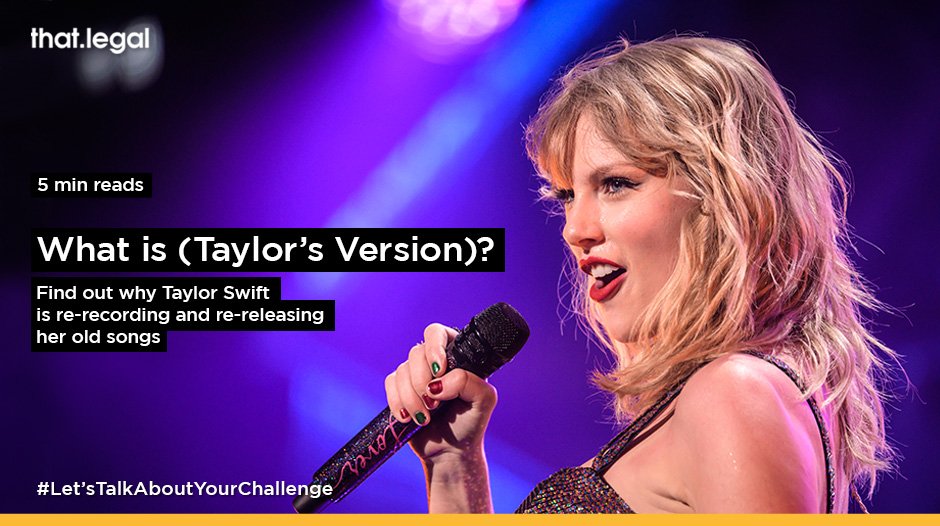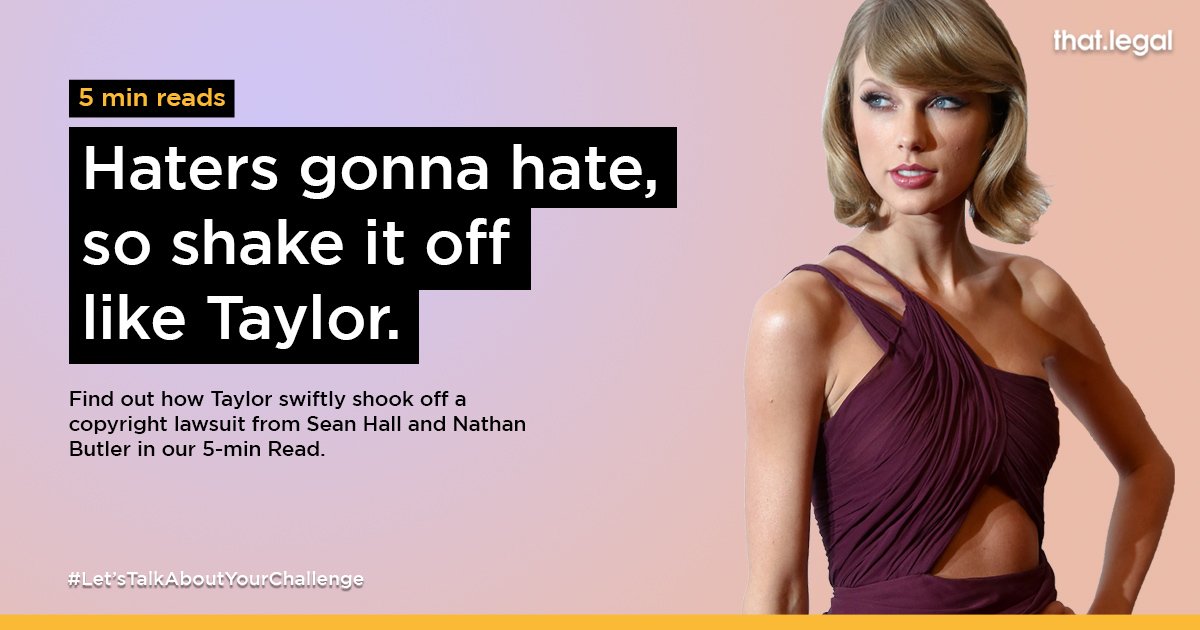What is (Taylor's Version)?
Introduction
Taylor Swift is coming to Singapore in 2024 and Taylor fever has been spreading rapidly, given the limited availability of tickets. Even though we are still more than 6 months away from her concert, the hype is incredible and there have been a ton of stories relating to this mega event. From ticket scalpers, to scammers, to someone winning 4D based on their Taylor Swift concert queue number, Taylor’s visit has been front and centre for the past couple of weeks.
We checked out Taylor’s Instagram account recently, when we noticed something interesting to us IP nerds: In her Instagram biography, there is a link to one of her songs, “I Can See You”, from her album, Speak Now. What we found curious, was the addition of “(Taylor’s Version)” in parenthesis to the title. Given that it is her song, why would she need to add this clarification?
We have Taylor-ed this article for you Taylor fans to explain what exactly Taylor’s version is and how it came to be.
(Taylor’s Version)
Since 2021, Taylor Swift has been re-releasing some of her older albums like “Fearless” and “Red”, but titling them instead, “Fearless (Taylor’s Version)” and “Red (Taylor’s Version)”. On Spotify, the songs, and albums that she re-released contain “Taylor’s Version” in parenthesis, while the original recordings do not. The reason for all this lies in her dispute with her former record label over the “masters” of her first six studio albums. Here is what happened.
In 2005, 15-year old Taylor was just starting out as an artist. She signed a 13-year recording deal with the record label, Big Machine Records, that gave the record company the ownership of the masters to Taylor’s first six albums in exchange for cash up front. A “masters” refers to the copyright in the sound recording of a piece of music. It is important to note here that Taylor did not sign away her rights to the lyrics, melodies, sheet music etc of the songs (known as publishing rights), only the copyright for the recordings – these rights are distinct in copyright law, and this distinction is vital to one’s understanding of the story.
After her contract expired in 2018, Taylor decided to move on from Big Machine and signed a deal with Republic Records instead. Taylor tried to buy back the old masters for her music from Big Machine, but the deal fell through because Big Machine allegedly wanted her to create 6 more albums under the label in exchange for the rights she sought – Taylor found this to be “unacceptable”.
In 2019, Big Machine Records, including the ownership of all masters and copyrights owned by the company, was bought by Scooter Braun, a big name in the music industry, who Taylor had beef with. She claims that he was an “incessant, manipulative bully” and that he tried to “dismantle” her musical legacy. To cut a long story short, Taylor was extremely displeased that the masters to her music now belonged to someone she considered to be an enemy.
This friction was exacerbated when Braun and Borchetta (the previous owner, but now CEO of Big Machine) allegedly prevented Taylor from performing her older songs at the American Music Awards (AMA) of 2019 and using her older material for her 2020 documentary, “Miss Americana”. Taylor also claimed that Borchetta told her team that she would be allowed to use the music only if she agreed to not re-record "copycat versions" of her songs. In response to this, Taylor commented: "the message being sent to me is very clear. Basically, be a good little girl and shut up. Or you'll be punished”. There was more back and forth after this, but Taylor eventually decided to play 4 songs from her first 6 albums at her 2019 AMA performance and was given the Artist of the Decade award.
After this saga, Taylor decided to take action. In August 2019, she announced that she would re-record and release her first 6 albums so that she would own the complete rights to them herself – however, she would only be able to do so starting in November 2020 due to the terms of her contract with Big Machine. Since she still owned the publishing rights, by re-recording her songs, she would be technically covering her own songs as new recordings, resulting in new masters that she would fully own. Since then, Taylor has re-released 3 of her 6 older albums – Fearless (Taylor’s Version), Red (Taylor’s Version), and Speak Now (Taylor’s Version). According to the artist, the reason she is re-recording her music is because she wants “[her] music to live on” – She further stated that: “I do want [my music] to be in movies, I do want it to be in commercials. But I only want that if I own it”.
This controversy was widely publicised, with some news platforms calling it “music’s biggest feud” and resulted in two distinct camps – Team Swift and Team Braun. Taylor’s fans stood firmly with her and the hashtags #IStandWithTaylor and #WeStandWithTaylor trended worldwide on Twitter.
The Legality
Despite this dispute being in the public eye, nothing was actually taken to court. Taylor had no legal recourse against Big Machine or Borchetta for selling the masters to Braun, and Braun/Borchetta had no recourse against Taylor for re-recording her songs. These legal issues have been covered by many legal scholars, but we figured that we would give you our take on the copyright issue from our Singaporean perspective.
What IF this was litigated in Singapore?
What if Braun had sued Taylor in Singapore for copyright infringement? In short, we do not think that this hypothetical action would have much merit here and is likely to be Swiftly dismissed.
In Singapore, a work may enjoy copyright protection if it, inter alia, falls under one of the recognised categories of the Copyright Act. As per the Act, “authorial works” (which are defined as literary, dramatic, musical, or artistic works) and “sound recordings” are distinct categories of works. In the case of a recorded song, there would be separate copyrights that arise from it – inter alia, the lyrics would be protected as a literary work, the melodies would be protected as a musical work, and the actual recording of the song would be protected as a sound recording. To borrow the US legal terminology, the copyright of the sound recording would be the masters and the rest of the rights would be the publishing rights.
As Taylor only signed away her rights to the sound recording, she remained the owner of the rest of the authorial rights relating to her songs/albums. Since she is technically just covering her own songs, she would simply need to give herself permission to do so. Therefore, we are of the opinion that if this dispute was litigated in Singapore, no liability would likely be found.
Taylor owns the non-masters rights to her songs by default because she was the author – she wrote her own lyrics and music, and the default position in Singapore is that the author of a copyright is the first owner of the same. This might not always be the case as many artists do not actually write their own songs, which means that they might not be the default owner of the rights, or they may have signed away their authorial rights inadvertently in an agreement where there was unequal bargaining power.
The takeaway here is that an artist who does not write their own songs might not enjoy the same default protections that Taylor would (assuming the same facts), and thus would need to take additional steps to protect their interests. For example, the artist could acquire the publishing rights to their songs through a written agreement or contract with the songwriter.
Conclusion
We are glad that Team Swift has come out of this stronger and is making a positive impact on the music industry #WeStandWithSwift. We hope that you enjoyed reading this article and found it informative. If you have any queries about copyright law in Singapore or any other matters, feel free to reach out to us.
Follow us on social.
We hope you enjoyed reading this post as much as we had in bringing it to you. If you would like to receive our content updates in a timely manner, follow us on your favourite social platforms.
Related Content
Disclaimer
This article does not constitute legal advice or a legal opinion on any matter discussed and, accordingly, it should not be relied upon. It should not be regarded as a comprehensive statement of the law and practice in this area. That.Legal LLC represents neither party in this dispute and is not privy to any confidential information pertaining to the parties. All facts stated herein are compiled from publicly available sources. If you require any advice or information, please speak to a practicing lawyer in your jurisdiction. No individual who is a member, partner, shareholder or consultant of, in or to any constituent part of That.Legal LLC accepts or assumes responsibility, or has any liability, to any person in respect of this article.




